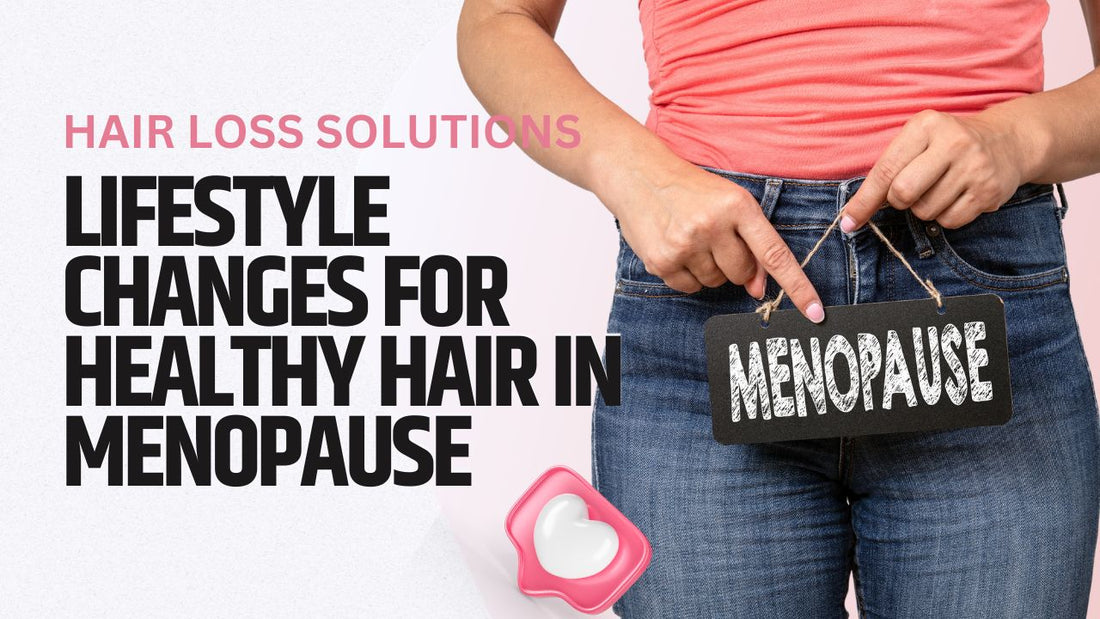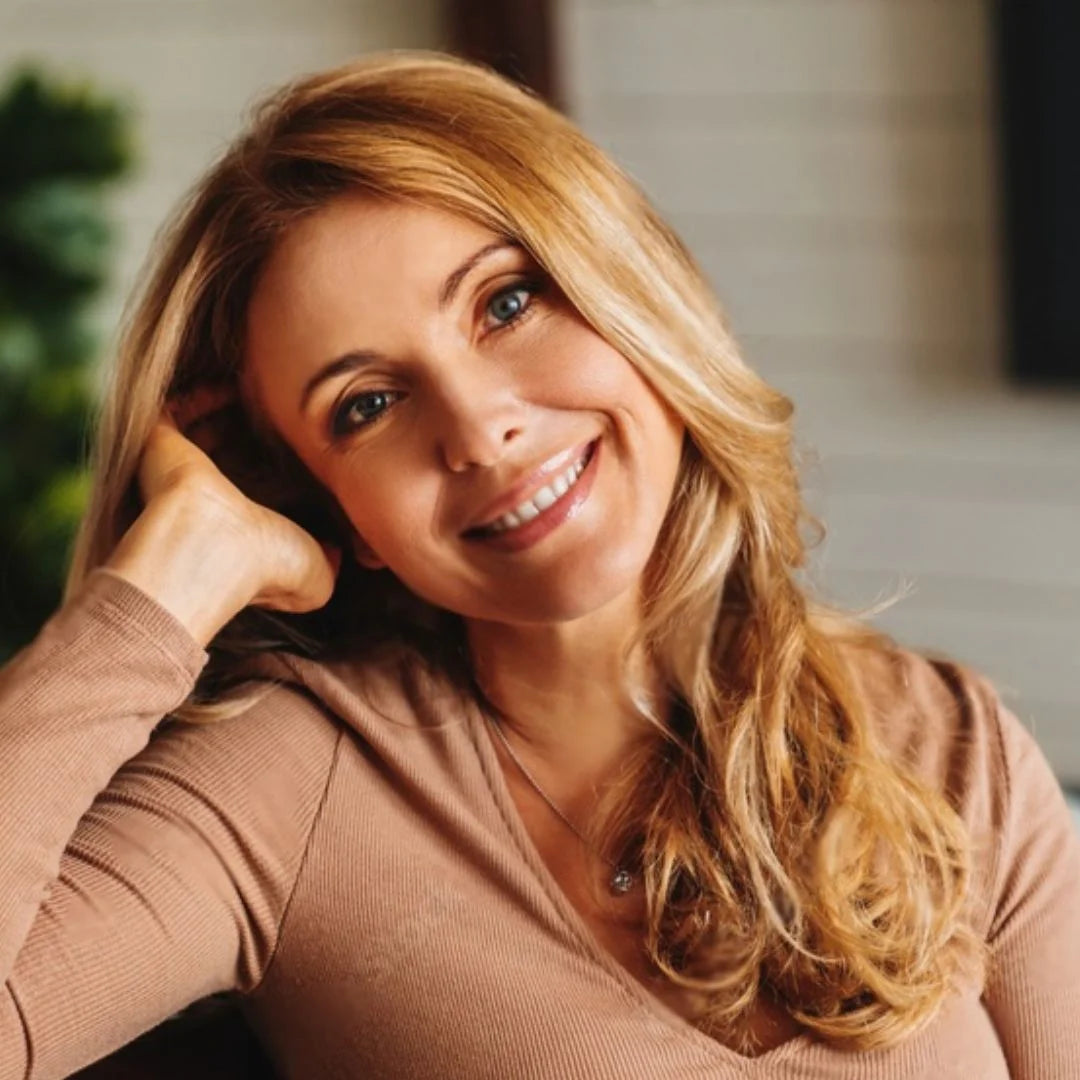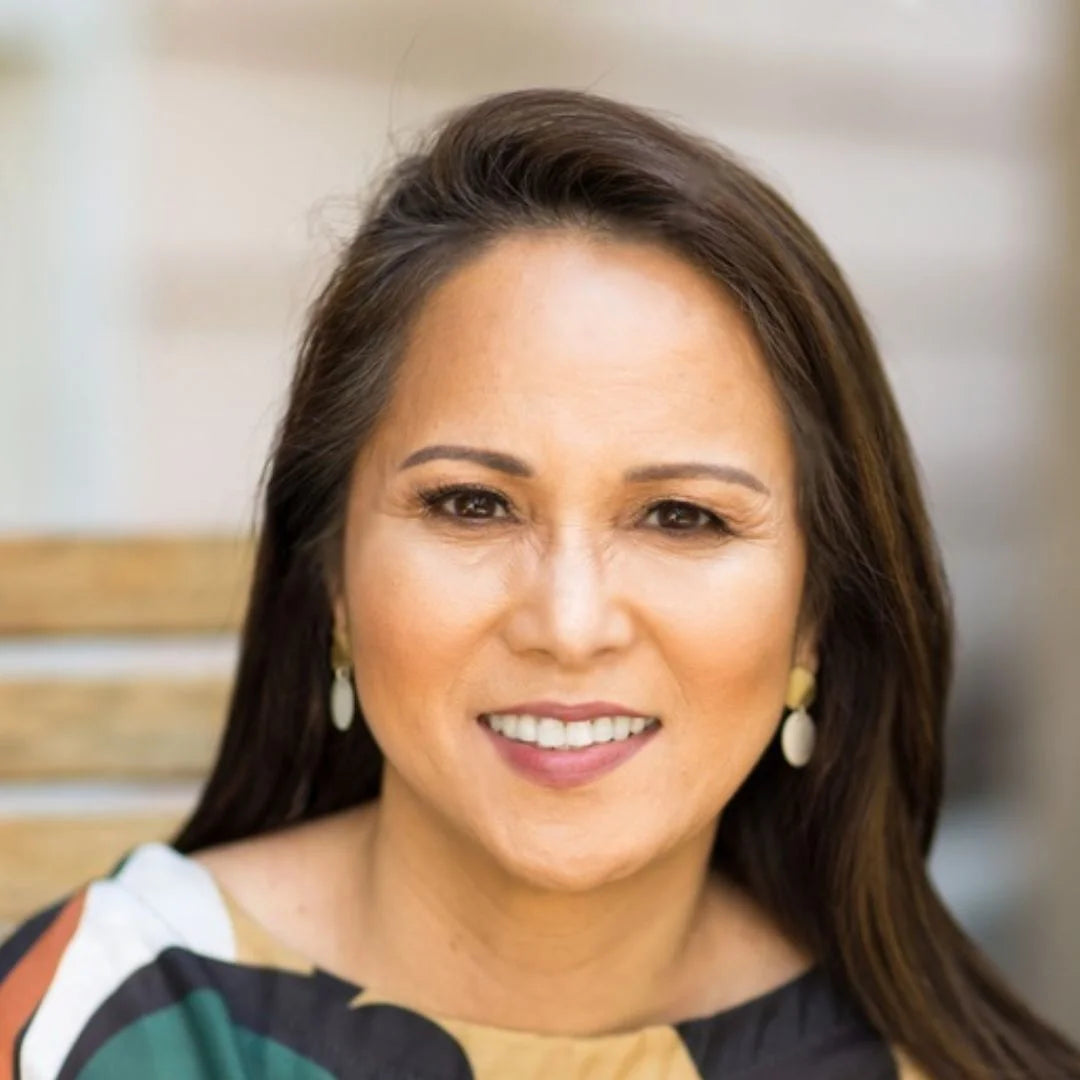
Menopausal Hair Loss: Lifestyle Changes for Healthy Hair in Menopause
Share
Menopause is a transformative phase in a woman's life, bringing with it a myriad of physical and hormonal changes. Among the many challenges women face during this time, one of the most prevalent is hair loss and changes in hair health. But fret not, because there are proactive steps you can take to maintain healthy and luscious locks. In this comprehensive guide, we'll delve into essential lifestyle changes and practices that can help you nurture your hair through menopause.

Understanding Menopausal Hair Loss
The Impact of Menopause on Hair Health
As women enter menopause, the decline in estrogen levels can have a profound effect on their hair. Estrogen plays a crucial role in hair growth and strength. With its reduction, hair can become thinner, more brittle, and prone to shedding.

Menopause triggers a series of hormonal changes, including a decrease in estrogen and progesterone. These hormones, in addition to testosterone, play essential roles in regulating hair growth. Estrogen, in particular, promotes hair growth and keeps hair in the growth phase for longer periods. When estrogen levels decline during menopause, hair growth can slow down, leading to hair thinning and a reduction in hair volume.
Types of Menopausal Hair Issues
Menopausal hair issues vary from person to person but often include hair thinning, dryness, and a change in texture. Understanding these challenges is the first step in addressing them effectively.

- Hair Thinning: Many women notice that their hair becomes noticeably thinner during menopause. This thinning can occur all over the scalp or in specific areas. It's often the result of a decrease in hair follicle size and a shorter hair growth cycle.
- Dryness and Brittle Hair: Menopause can also lead to dry, brittle, and less manageable hair. This is partly due to reduced oil production in the scalp, which can leave hair dry and prone to breakage.
- Change in Hair Texture: Some women may experience a change in their hair's natural texture during menopause. For example, straight hair may become wavier, or curly hair may become straighter. This change is typically temporary and can be attributed to hormonal fluctuations.
Nutrition and Diet for Healthy Hair
The Role of Nutrition in Hair Health
A balanced diet rich in essential nutrients is fundamental to healthy hair. Nutrients like biotin, vitamins A and C, and minerals such as zinc and iron play a vital role in promoting hair growth and maintaining its strength.

Hair follicles are among the most metabolically active structures in the body, and they require a constant supply of nutrients to function optimally. When you provide your body with the right nutrients, you support hair growth and overall hair health.
Essential Nutrients for Hair
To maintain healthy hair, incorporate foods like eggs, nuts, leafy greens, and lean proteins into your diet. These foods are packed with the vitamins and minerals your hair craves.

- Biotin: Biotin, also known as vitamin H, is essential for hair growth. It helps produce keratin, a protein that makes up the structure of your hair. Foods rich in biotin include eggs, nuts, and whole grains.
- Vitamins A and C: These vitamins play crucial roles in maintaining a healthy scalp. Vitamin A helps regulate sebum production, preventing a dry scalp, while vitamin C supports collagen production, which is essential for hair strength. Carrots, sweet potatoes, and citrus fruits are excellent sources.
- Zinc: Zinc is involved in numerous bodily functions, including hair growth. It helps keep the hair follicles healthy and supports the hair's structure. You can find zinc in foods like oysters, beef, and whole grains.
- Iron: Iron deficiency is a common cause of hair loss, especially in women. Ensure you're getting enough iron from sources like lean meats, beans, and fortified cereals.
Menopause-Friendly Recipes for Hair Health
Consider trying out delicious recipes that are not only good for your overall health but also beneficial for your hair. For example, a spinach and avocado salad or a berry smoothie can provide a healthy dose of hair-loving nutrients.
Here's a simple recipe idea for a nutrient-rich smoothie:
Hair-Boosting Berry Smoothie
Ingredients:
- 1 cup of mixed berries (strawberries, blueberries, raspberries)
- 1/2 ripe avocado
- 1 tablespoon of chia seeds
- 1/2 cup of Greek yogurt (or dairy-free alternative)
- 1 teaspoon of honey (optional)
- 1/2 cup of water or almond milk
Instructions:
- Blend all the ingredients until smooth.
- Enjoy your delicious and nutritious hair-boosting smoothie!
Exercise and Physical Activity
The Connection Between Exercise and Hair Health
Regular physical activity improves blood circulation, which, in turn, enhances nutrient delivery to hair follicles. This can stimulate hair growth and improve overall hair health.

Physical activity promotes a healthy cardiovascular system, ensuring that oxygen and essential nutrients are efficiently transported to all parts of your body, including your hair follicles. Improved blood circulation also helps remove waste products, keeping the hair follicles healthy.
Hair-Friendly Workouts for Menopausal Women
Opt for low-impact exercises like yoga, swimming, or brisk walking to get the benefits of physical activity without putting undue stress on your joints or body.
- Yoga: Yoga not only helps reduce stress but also promotes blood flow to the scalp through various poses and stretches. It can be an excellent choice for women experiencing menopausal hair loss.
- Swimming: Swimming is a low-impact aerobic exercise that promotes circulation and can be particularly refreshing during hot flashes.
- Brisk Walking: A daily walk is an accessible and effective way to improve circulation without causing excessive strain on the body. It's also a great way to reduce stress.

Remember that consistency is key when it comes to exercise and its impact on hair health. Aim for at least 30 minutes of moderate exercise most days of the week to reap the benefits.
Stress Management and Its Effect on Hair
Hair Loss and Stress in Menopause
Stress is a common companion during menopause and can exacerbate hair loss. High stress levels may lead to hormonal imbalances that negatively impact hair health.

During times of stress, your body produces hormones like cortisol, often referred to as the "stress hormone." Elevated cortisol levels can disrupt the normal hair growth cycle, leading to hair thinning and increased hair shedding.
Stress-Reduction Techniques
Incorporate stress-reduction practices into your daily routine. Meditation, mindfulness exercises, and deep breathing can help lower stress levels and promote healthier hair.
- Meditation: Regular meditation practice can help reduce stress and support emotional well-being. Find a quiet space, sit comfortably, and focus on your breath or a calming mantra for a few minutes each day.
- Mindfulness Exercises: Practicing mindfulness involves staying present in the moment and accepting your thoughts and feelings without judgment. Mindfulness can help you manage stress more effectively.
- Deep Breathing: Deep breathing exercises, such as diaphragmatic breathing, can activate your body's relaxation response. Take a few minutes each day to practice deep, slow breaths to reduce stress.

In addition to these techniques, consider engaging in activities that bring you joy and relaxation, whether it's reading, gardening, or spending time with loved ones. Finding healthy ways to manage stress is a crucial part of maintaining your hair's health during menopause.
Hair Care Tips for Menopausal Women
Choosing the Right Hair Products
Select hair care products specifically designed for menopausal hair. Look for those with ingredients like biotin, keratin, and collagen, which can fortify hair.
When choosing shampoos and conditioners, opt for products that are sulfate-free and gentle on your hair and scalp. Sulfates can strip away natural oils and contribute to dryness, which is a common concern during menopause.
Proper Hair Washing and Styling Techniques
Handle your hair gently to prevent breakage. Use a wide-tooth comb, avoid tight hairstyles, and limit the use of heated styling tools. Here are some tips for proper hair washing and styling:
- Washing: Use lukewarm water for washing your hair, as hot water can further dry out the scalp. Massage the shampoo gently into your scalp and let the conditioner sit for a few minutes to hydrate your hair.
- Drying: Pat your hair dry with a soft towel instead of vigorously rubbing it. When using a hairdryer, use the lowest heat setting and keep it at a safe distance from your hair to avoid heat damage.
- Styling: Minimize the use of heat styling tools like straighteners and curling irons. When you do use them, apply a heat protectant spray first. Opt for loose hairstyles that don't put excessive stress on your hair.

Recommended Hair Treatments and Masks
DIY hair treatments using natural ingredients like coconut oil, aloe vera, or avocado can rejuvenate your hair and combat dryness and damage. Here's a simple recipe for a nourishing hair mask:
Avocado and Honey Hair Mask
Ingredients:
- 1 ripe avocado
- 2 tablespoons of honey
- 1 tablespoon of olive oil
Instructions:
- Mash the avocado in a bowl until it's smooth.
- Add honey and olive oil to the mashed avocado and mix well.
- Apply the mixture to your clean, damp hair, focusing on the ends.
- Leave the mask on for 20-30 minutes.
- Rinse thoroughly with lukewarm water and shampoo as usual.
Use this mask once a week to help moisturize and strengthen your hair.
Sleep and Its Impact on Hair Health
Importance of Quality Sleep
A good night's sleep is essential for overall health, including hair health. During sleep, the body repairs and regenerates cells, including those responsible for hair growth.

When you're sleep-deprived, your body may redirect its energy away from non-essential functions like hair growth. This can lead to hair becoming weaker and more prone to breakage.
Sleep Hygiene Tips for Better Hair
Establish a consistent sleep schedule, create a comfortable sleep environment, and limit caffeine intake to improve the quality and duration of your sleep. Here are some tips for better sleep:
- Set a Sleep Schedule: Try to go to bed and wake up at the same times every day, even on weekends. Consistency helps regulate your body's internal clock.
- Create a Relaxing Bedtime Routine: Engage in calming activities before bed, such as reading a book, taking a warm bath, or practicing relaxation exercises.
- Optimize Your Sleep Environment: Ensure your bedroom is conducive to sleep. This includes a comfortable mattress and pillows, adequate room darkness, and a cool, quiet atmosphere.
- Limit Caffeine and Screen Time: Avoid caffeine and electronic devices (phones, tablets, computers) for at least an hour before bedtime, as they can interfere with sleep.
By prioritizing good sleep hygiene, you not only improve your hair's health but also enhance your overall well-being.
Consulting a Healthcare Professional
When to Seek Medical Advice
If you experience severe or sudden hair loss during menopause, it's advisable to consult a healthcare professional or dermatologist. They can diagnose any underlying issues and recommend suitable treatments.

It's important to differentiate between normal age-related hair changes and more serious issues that may require medical intervention. If your hair loss is causing you distress or if you notice significant hair shedding, thinning, or bald patches, don't hesitate to seek professional guidance.
Conclusion: Embrace Menopause with Healthy Hair
Maintaining healthy hair during menopause is not only possible but achievable through these lifestyle changes. Embrace this phase of life confidently, knowing that with proper care, you can have vibrant and beautiful hair.
FAQ
Q1: Can menopausal hair loss be reversed?
A1: While complete reversal may not always be possible, taking proactive steps like a balanced diet, proper hair care, and stress management can significantly improve hair health.
Q2: How long does menopausal hair loss typically last?
A2: Menopausal hair loss can vary in duration. For some, it may be temporary, while others may experience it throughout menopause. Implementing healthy practices can help mitigate its effects.
Q3: Are there any supplements for menopausal hair loss?
A3: Some women find supplements like biotin, collagen, or omega-3 fatty acids beneficial for hair health. However, it's important to consult with a healthcare professional before starting any supplements.
Q4: Is hair loss during menopause inevitable?
A4: While many women experience some degree of hair loss during menopause, its severity can be managed with the right lifestyle changes and treatments.
Q5: Can menopausal hair loss be a sign of a more serious health issue?
A5: In some cases, hair loss can be related to underlying health conditions. If you have concerns, it's advisable to seek medical advice to rule out any other health issues.














